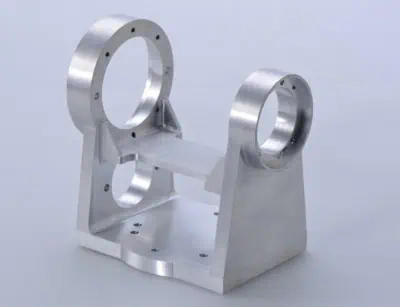With good mechanical properties, easy to work, very good electrical conductivity and a relatively good resistance to external elements, aluminium is a material of choice for the manufacturing of mechanical parts. You’ll find everything you need to know on manufacturing parts in aluminium in below guide:
Know everything about the material
Characteristics
Aluminium is a metal (Al – atomic number 13) 3 times lighter than steel. It’s density, 2.7g/cm3 is just slightly above glass. Due to it’s relatively low density, aluminium is used a lot in space & aeronautics industries, construction (sky-scrappers) or food industry (pans, cans).
Production
Annual worldwide aluminium output is more or less 65 millions of tons. Fabrication is done in two main steps, alumina extraction from bauxite and then refining to get 99%-99.99% purity aluminium billets. This process uses a lot of energy, cost of it range for around a third of production costs.
World first aluminium producer, by far, is China where around half of the world’s aluminium is produced.
Different qualities /grades of aluminium
There are numerous aluminium grades, we are presenting below most common ones by type of alloys :
| Aluminium series number | Particularities | Details |
|---|---|---|
| 1000 series | It correspond to aluminium of high purity (Al>99%) | Aluminium from this series is versatile and can be worked by many means. Since it is quite pure it is rather simple to be anodized. The most common grade is aluminium 1100 which is widely used in food industry. |
| 2000 series | Copper (Cu) reinforced alloys | Offers good mechanical characteristics but have a bad weld-ability and not easy to anodized. Most common grade is 2017/2017A which is very common for machined parts. |
| 3000 series | Manganese (Mn) reinforced alloys | Very competitive alloy, but les resistant to corrosion than series 1000 or 6000. Most common grade is 3003. |
| 4000 series | Silicon (Si) reinforced alloys | Common grade is 4032 used in extrusion and forge. |
| 5000 series | Magnesium (Mg) reinforced alloys | Mostly used by the food industry. |
| 6000 series | Magnesium and silicon reinforced alloys. | 6061 grade has very good mechanical properties, is easy to weld, and to anodized. |
| 7000 series | Zinc (Zn) reinforced alloys | |
| 8000 series | Other kinds of alloys |
Aluminium price
Altough bauxite is present in big quantities on earth, aluminium is a material which price is fluctuating a lot due to the big impact energy price has on its pricing. In the last 15 years, price is varying mainly between 1600 & 2600 USD/ton with a low at 1150 USD/ton in 2009 and a high at 3500 USD/ton end of 2021. Aluminium price per ton is roughly 2 to 3 times higher than steel price but also with a wider price variations.
Aluminium part manufacturing processes
Aluminium due to its softness and its relatively low fusion point (around 650°C) is a easy working material.
Machining
Aluminium parts machining is very common, aluminium is easier to machined than steel and induce slower wearing of cutting tools. It can be machined on high speed numerical machining centers, lathes, or milling centers.
Machining chips are easily recyclable. Raw material blocks are easily found in cylinders or blocs. Aluminium machining can be done on all kind of part size and from unitary parts to big series.
It is possible to reach tolerances of the order of a hundredth of a millimeter.
Casting
Aluminium casting process is a key process in the automotive industry, most of the engine parts are made in high series in high-pressure die casting.
Casting process necessitate the opening of a mold and therefore required high or medium MOQ.
Following the used casting process : sand casting, lost was casting or high-pressure die casting it is possible to reach different levels of quality of the parts (aspect, tolerances, complexity, wall thickness). For the high-pressure die casting, Silicon reinforced alloys are preferred as they improve the flow-ability of the melted aluminium.
Metal Sheet
Mills provide aluminium sheet rolls, which once cut, can be worked into different kind of parts:
Bending / punching
Bending and punching are wildly use for manufacturing of electronics casings. One should consider aluminium sheets like paper sheets that can be bend into different solid shapes of low wall thickness. Aluminium having a good electrical conductivity, casings can be used for a good earth connection medium.
Metal sheet bending can also be used for structural aluminium parts.
Drawing
This process draw the aluminium sheet with a big press tool that will form a part, usually a container like a pan or kitchen sink. Shape than can be done with drawing process are limited.
Tank manufacturing
Manufacturing of container parts, by bending, welding or riveting. Example : food tanks.
Extrusion
Pressing through an extrusion tool of an aluminium billet, output will be meters long aluminium profiles that can further be cut to needed length. Aluminium extrusion is only limited to certain shapes of parts, but is very common on windows frame or electronics heat-sink manufacturing.
Aluminium part protection
Aluminium does not rust like steel, but a thin layer of oxidation will form on the surface with the contact of oxygen.
Anodisation
Anodisation will force external oxidation into a very hard protecting alumina layer on the surface of the part. This layer in naturally uncolored but can be colored for cosmetic purposes by adding chemical dyes during the process. For example, the MacBook casing is protected with a think layer of grey anodisation done after parts machining.
Anodisation is a chemical process enhanced by the presence of a electric field created by an anode and a cathode dived in the chemical bath.
Painting
In a more classical manner, aluminium parts can be painted, but this process is less common than anodisation with is cheap and offers a very good protection.
Aluminium polishing
Aluminium have a natural bright aspect, which can be sublimed with surface polishing. In order to keep the reflecting effect after polishing the surface need to be protected with silica layer to avoid oxydation.
How to buy custom manufactured aluminium parts ?
It is important to choose the best process for the manufacturing of custom aluminium parts, which takes into account quantities, quality and type of the parts. Many suppliers specialize in each of above enumerated process.
Don’t hesitate to contact AGC Industrial Solution to benefit from our expertise and receive quickly a quote for your custom needs of aluminium mechanical parts.








